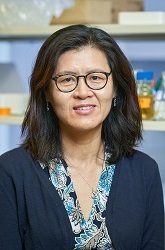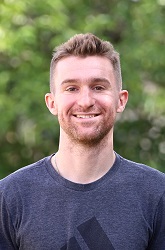 Libo Shan, a plant biologist and molecular pathologist, is the Christine Richardson Professor in Agricultural Biology in the Department of Biochemistry and Biophysics at Texas A&M University. Her research focuses on gaining a mechanistic understanding of plant disease resistance and pathogen pathogenicity. The ultimate goal of her work is to apply the knowledge gained from model plants to enhance the disease resistance of cotton—a major source of fiber, feed, and oil products. Libo’s group has been at the forefront of developing various functional genomic, cellular, and biochemical platforms specifically designed for studying cotton. By utilizing these innovative tools, the group aims to unravel the intricate mechanisms underlying disease resistance in cotton and pathogen virulence and to identify novel components that can contribute to improving the overall agricultural performance of this economically important crop.
Libo Shan, a plant biologist and molecular pathologist, is the Christine Richardson Professor in Agricultural Biology in the Department of Biochemistry and Biophysics at Texas A&M University. Her research focuses on gaining a mechanistic understanding of plant disease resistance and pathogen pathogenicity. The ultimate goal of her work is to apply the knowledge gained from model plants to enhance the disease resistance of cotton—a major source of fiber, feed, and oil products. Libo’s group has been at the forefront of developing various functional genomic, cellular, and biochemical platforms specifically designed for studying cotton. By utilizing these innovative tools, the group aims to unravel the intricate mechanisms underlying disease resistance in cotton and pathogen virulence and to identify novel components that can contribute to improving the overall agricultural performance of this economically important crop.
 Catherine Danmaigona Clement is an accomplished scientist who recently obtained her PhD in plant breeding from Texas A&M University. In her research on breeding upland cotton for resistance to Fov4, she deployed genomics to understand the changing dynamics of the emerging cotton disease. She worked very closely with faculty in Plant Breeding, Plant Pathology and Microbiology, Biochemistry and Biophysics, and AgriLife Research and Extension to apply an intense, multidisciplinary effort on studying Fov4. Her research incorporated various approaches, including pathology, molecular and cellular biology, genetic and genomic detection of pathogen virulence, race characterization, identification of resistant sources, and discovery of resistance gene loci in upland cotton. Given her expertise, she has joined Bayer Crop Science as a data scientist specializing in computational genomics; she will leverage her knowledge of plant and pathogen genomics to contribute to crop improvements through innovative breeding strategies.
Catherine Danmaigona Clement is an accomplished scientist who recently obtained her PhD in plant breeding from Texas A&M University. In her research on breeding upland cotton for resistance to Fov4, she deployed genomics to understand the changing dynamics of the emerging cotton disease. She worked very closely with faculty in Plant Breeding, Plant Pathology and Microbiology, Biochemistry and Biophysics, and AgriLife Research and Extension to apply an intense, multidisciplinary effort on studying Fov4. Her research incorporated various approaches, including pathology, molecular and cellular biology, genetic and genomic detection of pathogen virulence, race characterization, identification of resistant sources, and discovery of resistance gene loci in upland cotton. Given her expertise, she has joined Bayer Crop Science as a data scientist specializing in computational genomics; she will leverage her knowledge of plant and pathogen genomics to contribute to crop improvements through innovative breeding strategies.
 Brendan Mormile recently completed his PhD in plant pathology and presently serves as a postdoctoral research associate in the Department of Biochemistry and Biophysics at Texas A&M University. His research focuses primarily on understanding the molecular and genetic basis underlying TAL effector-driven pathogen virulence and deploying this knowledge to improve cotton disease resistance. To achieve this, he employs a diverse range of technical approaches, including whole-genome sequencing and assembly, development of genetic knockout mutants, construction of designer TAL effectors, and screening the genetic requirements of cotton susceptibility genes. Brendan has utilized CRISPR/Cas9 gene editing for generating transgenic cotton harboring genetic mutations to disrupt Xcm disease susceptibility and for developing virus-vectored heritable genomic modifications for cotton transformation. Additionally, he has contributed significantly as a founding member and organizing committee chair of the Texas A&M Genome Editing Symposium and was a recipient of the COALS Excellence Fellowship.
Brendan Mormile recently completed his PhD in plant pathology and presently serves as a postdoctoral research associate in the Department of Biochemistry and Biophysics at Texas A&M University. His research focuses primarily on understanding the molecular and genetic basis underlying TAL effector-driven pathogen virulence and deploying this knowledge to improve cotton disease resistance. To achieve this, he employs a diverse range of technical approaches, including whole-genome sequencing and assembly, development of genetic knockout mutants, construction of designer TAL effectors, and screening the genetic requirements of cotton susceptibility genes. Brendan has utilized CRISPR/Cas9 gene editing for generating transgenic cotton harboring genetic mutations to disrupt Xcm disease susceptibility and for developing virus-vectored heritable genomic modifications for cotton transformation. Additionally, he has contributed significantly as a founding member and organizing committee chair of the Texas A&M Genome Editing Symposium and was a recipient of the COALS Excellence Fellowship.
